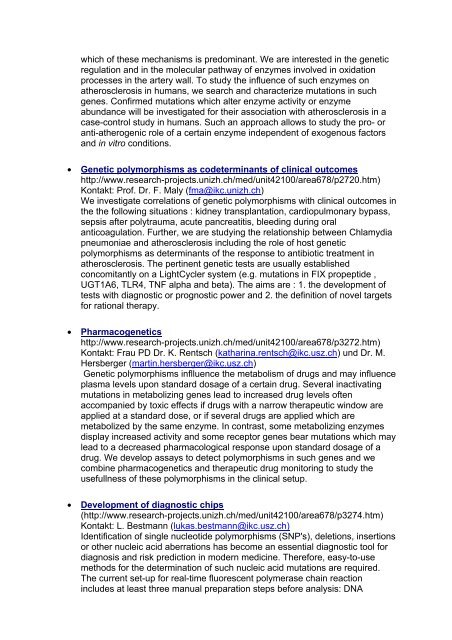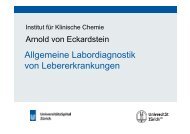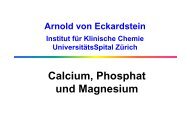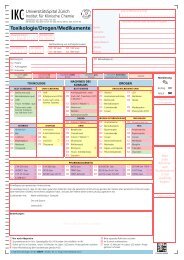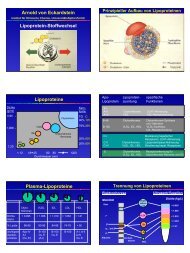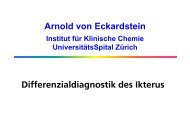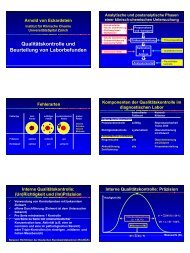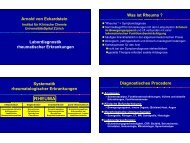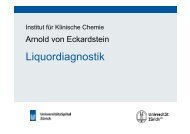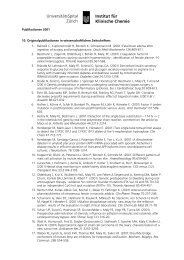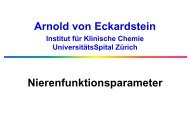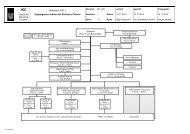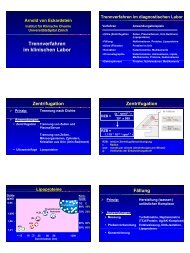Akademischer Bericht 2002 - Institut für Klinische Chemie ...
Akademischer Bericht 2002 - Institut für Klinische Chemie ...
Akademischer Bericht 2002 - Institut für Klinische Chemie ...
Erfolgreiche ePaper selbst erstellen
Machen Sie aus Ihren PDF Publikationen ein blätterbares Flipbook mit unserer einzigartigen Google optimierten e-Paper Software.
which of these mechanisms is predominant. We are interested in the geneticregulation and in the molecular pathway of enzymes involved in oxidationprocesses in the artery wall. To study the influence of such enzymes onatherosclerosis in humans, we search and characterize mutations in suchgenes. Confirmed mutations which alter enzyme activity or enzymeabundance will be investigated for their association with atherosclerosis in acase-control study in humans. Such an approach allows to study the pro- oranti-atherogenic role of a certain enzyme independent of exogenous factorsand in vitro conditions.• Genetic polymorphisms as codeterminants of clinical outcomeshttp://www.research-projects.unizh.ch/med/unit42100/area678/p2720.htm)Kontakt: Prof. Dr. F. Maly (fma@ikc.unizh.ch)We investigate correlations of genetic polymorphisms with clinical outcomes inthe the following situations : kidney transplantation, cardiopulmonary bypass,sepsis after polytrauma, acute pancreatitis, bleeding during oralanticoagulation. Further, we are studying the relationship between Chlamydiapneumoniae and atherosclerosis including the role of host geneticpolymorphisms as determinants of the response to antibiotic treatment inatherosclerosis. The pertinent genetic tests are usually establishedconcomitantly on a LightCycler system (e.g. mutations in FIX propeptide ,UGT1A6, TLR4, TNF alpha and beta). The aims are : 1. the development oftests with diagnostic or prognostic power and 2. the definition of novel targetsfor rational therapy.• Pharmacogeneticshttp://www.research-projects.unizh.ch/med/unit42100/area678/p3272.htm)Kontakt: Frau PD Dr. K. Rentsch (katharina.rentsch@ikc.usz.ch) und Dr. M.Hersberger (martin.hersberger@ikc.usz.ch)Genetic polymorphisms inflluence the metabolism of drugs and may influenceplasma levels upon standard dosage of a certain drug. Several inactivatingmutations in metabolizing genes lead to increased drug levels oftenaccompanied by toxic effects if drugs with a narrow therapeutic window areapplied at a standard dose, or if several drugs are applied which aremetabolized by the same enzyme. In contrast, some metabolizing enzymesdisplay increased activity and some receptor genes bear mutations which maylead to a decreased pharmacological response upon standard dosage of adrug. We develop assays to detect polymorphisms in such genes and wecombine pharmacogenetics and therapeutic drug monitoring to study theusefullness of these polymorphisms in the clinical setup.• Development of diagnostic chips(http://www.research-projects.unizh.ch/med/unit42100/area678/p3274.htm)Kontakt: L. Bestmann (lukas.bestmann@ikc.usz.ch)Identification of single nucleotide polymorphisms (SNP's), deletions, insertionsor other nucleic acid aberrations has become an essential diagnostic tool fordiagnosis and risk prediction in modern medicine. Therefore, easy-to-usemethods for the determination of such nucleic acid mutations are required.The current set-up for real-time fluorescent polymerase chain reactionincludes at least three manual preparation steps before analysis: DNA


